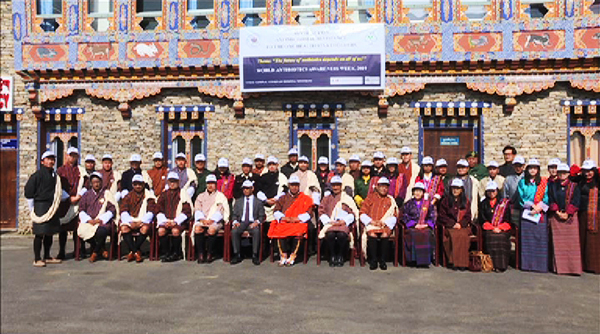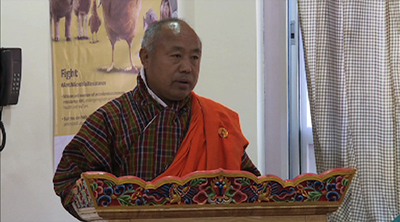 To increase awareness of global antibiotic resistance and to encourage best practices to avoid further spread of antibiotic resistance, World Antibiotics Awareness Week was observed in the capital today.
To increase awareness of global antibiotic resistance and to encourage best practices to avoid further spread of antibiotic resistance, World Antibiotics Awareness Week was observed in the capital today.
Antibiotics Resistance occurs when a specific antibiotic has lost its ability to kill or stop the growth of bacteria leading to longer illness or even death.
The Department of Livestock under Ministry of Agriculture and Forest celebrated this year’s World Antibiotic Awareness Week with the theme “The Future of Antibiotics depends on us all”.
Speaking at the event today, the Agriculture Minister, Yeshey Penjor said failure to use antibiotics in a prudent way is one of the main reasons attributing to development of resistance in disease-causing agents.
 “When we talk of antibiotics to fight the bacterial agents, we can think of tackling this by either increasing the immune capacity or means of reducing the antibacterial resistance,” said Lyonpo.
“When we talk of antibiotics to fight the bacterial agents, we can think of tackling this by either increasing the immune capacity or means of reducing the antibacterial resistance,” said Lyonpo.
Over-prescribing of antibiotics, self-medication, over-use of antibiotics in the livestock and fish farming, poor infection control in health facilities and lack of hygiene and poor sanitation are some of the main causes of the Antibiotic resistance.
In line with the antibiotics resistance, the gathering also saw advocacy programme on Antimicrobial Resistance (AMR) to the various health stakeholders. Antimicrobials are essential medicines to control and treat infection in both humans and animals. Misuse or overuse of antimicrobials can also increase resistance risk, endangering both animals and human health and welfare.
“If you look at the animal side, inappropriate choice of treatment and use of growth promoter in animal feeds causes resistance in the bacteria. And the antibiotics will no longer act on this bacteria and the risk is that this resistant bacteria can get transmitted to human from the animal,” said Dr N.K Thapa, the Focal Person for AMR, Department of Livestock at Ministry of Agriculture and Forest.
The World Health Organisation (WHO) classified Antimicrobial Resistance as one of the ten threats to global health in 2019. However, WHO representative to Bhutan assured the organization is working with the relevant partners to implement a global action plan to tackle antimicrobial resistance by increasing awareness and knowledge, reducing infection and encouraging prudent use of antimicrobials.
Passang Dorji






